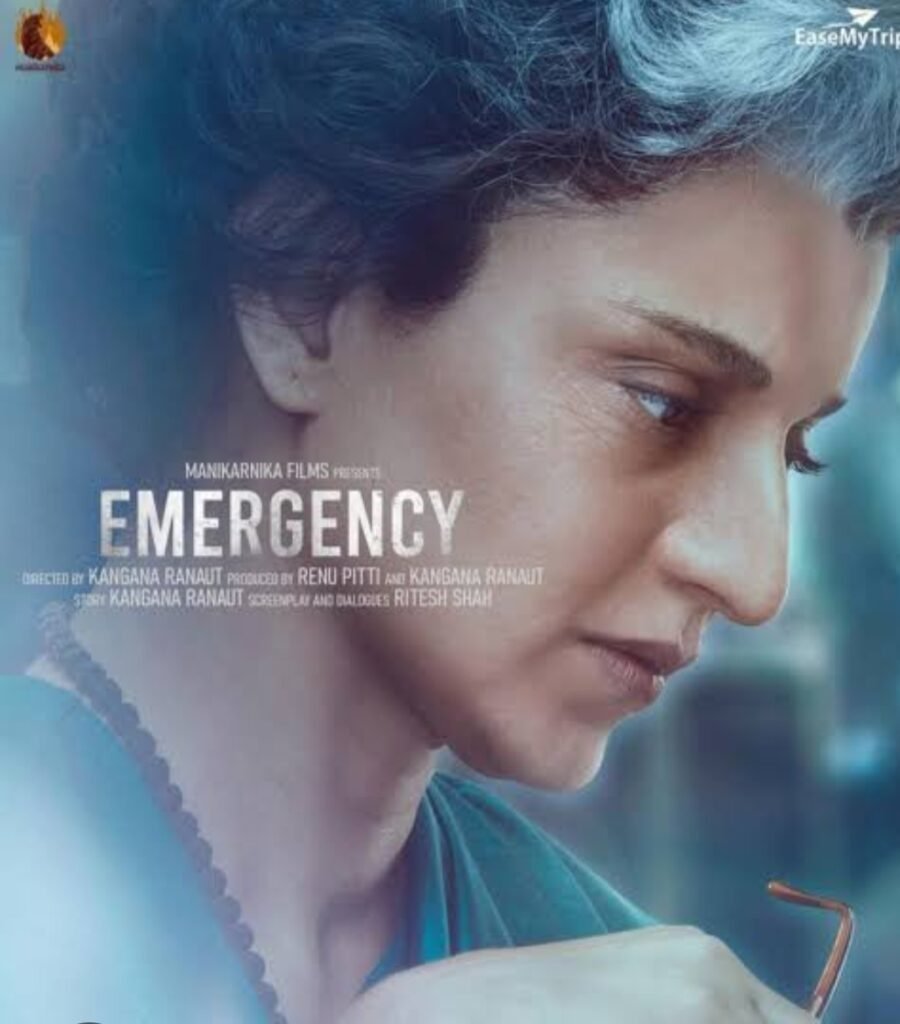“Emergency,” is a historical drama that focuses on one of the most chaotic and controversial periods in Indian history. It is directed and produced by Kangana Ranaut, who also portrays Indira Gandhi. The film offers a dramatic portrayal of these events, delving into both the political climate and the Prime Minister’s personal life during this era.
The film explores the turbulent period of the Emergency in India from 1975 to 1977, marked by press censorship, suspension of civil liberties, and mass detentions under Prime Minister Indira Gandhi. The film has sparked controversy and faced challenges from the Central Board of Film Certification (CBFC). The controversy began with the trailer, which depicted Jarnail Singh Bhindranwale, leader of the Khalistan movement, as promising votes for Congress in exchange for a separate Sikh state. This portrayal led the Delhi Sikh Gurdwara Management Committee (DSGMC) to demand a ban on the film, claiming it misrepresents the Sikh community and could incite hatred. It was reported that the film’s release, originally set for September 6th, was postponed due to concerns about offending religious sentiments. Kangana Ranaut, claimed that the CBFC’s clearance was delayed due to threats against board members.
Certificate From CBFC
The Central Board of Film Certification (CBFC), under the Cinematograph Act of 1952, approves, edits, or bans films to ensure content aligns with societal standards. The movie was submitted to the CBFC on July 8, 2024. Further, the Examining Committee (EC), reviewed the movie under rule 23 of the Cinematograph (Certification) Rules, 2024 and recommended a ‘UA’ certificate with modifications. The applicant made the required modifications, which were verified by the Examining Officer and a panel member.
After verifying the required modifications, the Examining Officer sealed the Digital Cinema Package (DCP) of the film “Emergency,” and the certificate was generated online on August 29, 2024. Consequently, various Sikh groups moved Madhya Pradesh High Court claiming that the movie violated the Fundamental rights of the Sikh community, and demanded an unconditional apology from the actress. The Deputy Solicitor General appearing for Union of India and CBFC stated that since the film “Emergency” has not been certified and is still under examination, any further representations from organizations, bodies, or individuals will be considered during the certification process.
The Madhya Pradesh High Court disposed of the petition, allowing the petitioners to file a comprehensive representation to the CBFC regarding objections to the film “Emergency” and its trailer. The CBFC then reviewed these objections and shall take appropriate action before finalizing the certification of the film. The court did not address the merits of the contentions and reserved all rights for the parties involved.
The film’s producer Zee Entertainment Enterprises had moved the Bombay HC seeking a direction to the Central Board of Film Certification (CBFC) to issue the certificate for the biographical drama ‘Emergency’. The Bombay High Court refused to direct CBFC to issue a certificate to the movie as the Madhya Pradesh High Court has already ordered the Censor Board to decide the representations made by the Jabalpur Sikh Sangat, which have objected to the film and its trailer. Further, the Bombay High Court ordered CBFC to decide the representations made by the Jabalpur Sikh Sangat or anyone else, latest by September 18. Kangana Ranaut criticized the CBFC, arguing the film presents a factual portrayal of history and that artistic freedom should not be hindered by political pressures. She stressed that her film is based on documented events and should be seen as a work of art, not a political statement.
“Kissa Kursi Ka” based on Indira Gandhi is yet another example of facing challenges while getting the certification. It was directed by parliamentarian Amrit Nahata and it faced significant opposition from the government during the 1975 Emergency. Initially submitted for certification in April 1975, its prints were seized and burned. After years of delay, the film was finally released in 1978.
Conclusion
The Central Board of Film Certification (CBFC) has historically aligned its decisions with India’s socio-political climate, often scrutinizing films that tackle sensitive subjects. An example of this is Anurag Kashyap’s 2001 film Paanch, which faced a ban despite making several cuts. The ongoing controversy surrounding Kangana Ranaut’s Emergency, which explores politically charged themes related to former Prime Minister Indira Gandhi and the Emergency period (1975-1977), reflects a continuation of these tensions.
This debate highlights broader issues about how historical events are represented in popular culture and the extent of creative freedom filmmakers possess. The judiciary has played a pivotal role in such cases, as demonstrated by the Bombay High Court’s intervention in the Udta Punjab case, where the court emphasized that audiences should have the autonomy to choose what they view, countering the CBFC’s restrictive measures.
The controversy surrounding Emergency is not just about a single film but underscores the persistent challenge of balancing artistic expression with societal and political sensitivities. As Bollywood increasingly engages with politically and historically sensitive topics, there is a growing call for a more transparent and consistent approach to film certification. This ongoing struggle reflects the broader issues of preserving creative freedom while navigating the complexities of a diverse and politically active society in India.
Authors: Raisha Bansal & Ria Hiranandani

